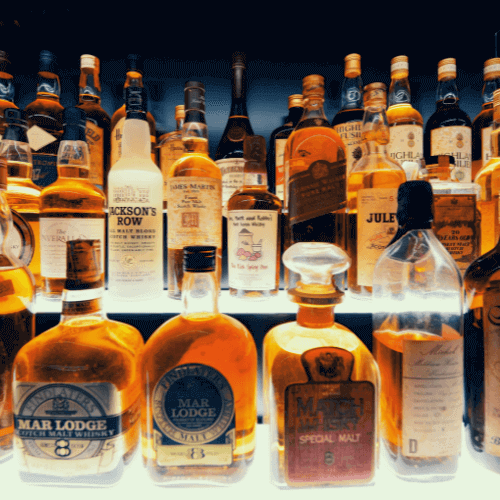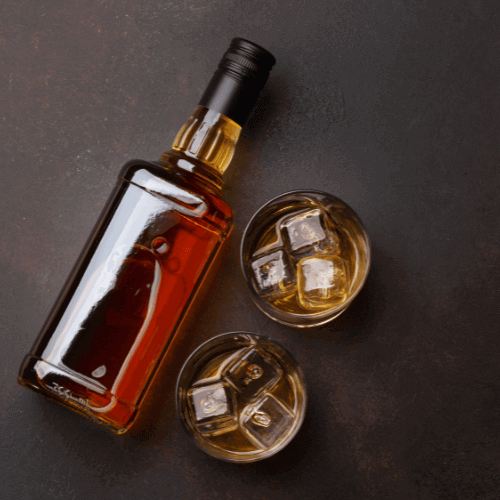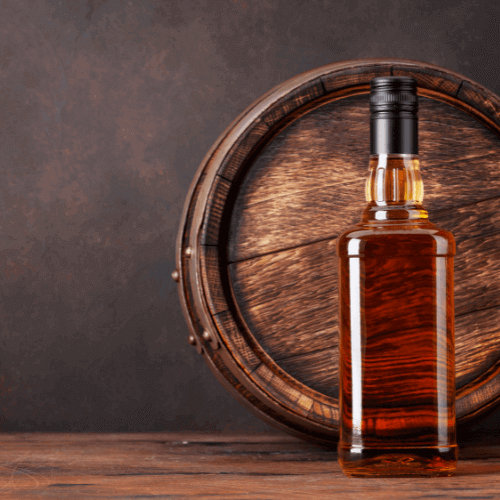Facebook Print Email WhatsApp Table of Contents The Dark and Stormy, sometimes referred to as the “dark n stormy”, is...

Whiskey has long been celebrated for its rich flavors, distinct aromas, and the delightful experience it offers to everyone. It’s not just a beverage, it’s an invitation to embark on a sensory journey that tantalizes the taste buds and warms the soul.
The enjoyment of whiskey extends beyond the act of drinking it. It begins with the careful selection of the perfect bottle, exploring a myriad of options from different regions and distilleries. Then comes the art of storing whiskey properly, ensuring that its flavors mature gracefully over time.
As we delve deeper into the realm of whiskey appreciation, we discover the significance of tasting techniques, the importance of different glassware, and the pleasure of pairing it with complementary flavors. Each sip unveils a story, told through the complexities of its composition, making every drinking experience unique and fascinating.
Through proper whiskey storage, we can unlock the full potential of this alcoholic beverage and revel in the camaraderie it fosters among enthusiasts.

One often overlooked factor is the impact of light exposure on the quality and taste of whiskey. Whiskey, particularly those aged in oak barrels, is sensitive to light, and prolonged exposure can lead to undesirable changes. Ultraviolet (UV) rays found in sunlight can break down organic compounds in whiskey, altering its flavor profile and diminishing its overall quality. This is why storing whiskey in a dark place is crucial. By shielding it from light, whether natural or artificial, you preserve the whiskey’s integrity and protect its delicate balance of flavors. Ideal storage locations include dark cupboards, cellars, or dedicated whiskey cabinets. Remember, a properly stored bottle of whiskey will reward you with a more consistent and enjoyable drinking experience, ensuring that each sip is a true testament to the craftsmanship that went into its creation.
Another crucial factor that greatly influences the longevity of whiskey is the storage temperature. Cool storage conditions play a pivotal role in maintaining the integrity of this distilled beverage. Whiskey is highly susceptible to heat, and excessive warmth can accelerate the aging process, leading to an undesirable imbalance in flavors. By storing whiskey in a cool environment, typically between 15 to 20 degrees Celsius (59 to 68 degrees Fahrenheit), one can safeguard its delicate aromas and prevent unwanted chemical reactions. The cool temperature helps slow down the oxidation process, reducing the risk of flavor deterioration and extending the whiskey’s lifespan. Moreover, a cool storage environment also prevents evaporation and minimizes the risk of cork deterioration, ensuring that every sip of whiskey delivers a pleasurable experience. Thus, to fully appreciate the nuances of this liquid gold, it is crucial to prioritize cool storage conditions for our cherished whiskey bottles.

Storing bottles of whiskey upright and monitoring the condition of the cork are essential practices for any whiskey enthusiast. By storing the bottles upright, we ensure that the liquid and air contact is minimized, preventing potential damage to the whiskey. When a bottle is placed horizontally, the liquid comes in contact with the cork, which can lead to deterioration and potential leakage. By keeping the bottle upright, we maintain the integrity of the cork and preserve the whiskey’s quality and flavor over time. Additionally, regularly monitoring the condition of the cork is crucial. A deteriorating or damaged cork can allow air to enter the bottle, leading to oxidation and negatively impacting the whiskey’s taste. By regularly inspecting the cork and ensuring it remains intact, we guarantee that our prized whiskey collection stays in optimal condition and is ready to be enjoyed.
Pro Tip – To keep the cork in good condition, flip the bottle occasionally every few months. This helps avoid the cork from drying out or becoming oxidized.

The protection of whiskey bottles and label conditions holds immense significance in the world of whiskey appreciation and collection. Whiskey, a distinguished spirit crafted with precision and aged to perfection, deserves to be safeguarded with utmost care. Preserving the bottle’s integrity ensures the longevity and quality of the whiskey it holds.
The bottle acts as a guardian, shielding the liquid from external elements such as light, heat, and air. As said, exposure to sunlight or extreme temperatures can degrade the whiskey’s flavor and diminish its overall quality. Additionally, a well-preserved label serves as a historical artifact, showcasing the brand, distillery, and vital information about the whiskey.
For whiskey collectors, maintaining the bottle and label condition is vital for authentication and investment value. A pristine bottle and label signify a well-preserved whiskey, increasing its desirability among enthusiasts and potential buyers.
In conclusion, protecting the whiskey bottle and label condition is crucial for ensuring the taste, quality, and historical significance of this fine spirit. By valuing and preserving these aspects, we honor the craftsmanship and legacy of whiskey-making while enhancing the pleasure derived from its consumption and collection.

When storing whiskey, it is best to keep it in a dark, cool place like a cupboard, cellar, or specially designed cabinet. This will help preserve the flavor and quality of your whiskey.
Yes, but it’s not recommended at all. It is preferable to store bottles of whiskey upright.
Unopened whiskey can be stored indefinitely, as the high alcohol content and sealed bottle help preserve its quality over time. However, as said, it’s important to store it in a cool, dark place away from direct sunlight and extreme temperature fluctuations to maintain its flavor and integrity for years to come.
After opening a bottle of whiskey, it is crucial to store it properly to maintain its quality and flavor. To preserve the distinct characteristics, store the whiskey in a cool, dark place away from direct sunlight and extreme temperatures. Seal the bottle tightly to prevent oxidation.
Storing whiskey in the freezer is generally not recommended. Freezing alters the chemical compound and can dull the flavors and aromas. Additionally, the expansion of liquid can cause the bottle to crack or break.
Facebook Print Email WhatsApp Table of Contents The Dark and Stormy, sometimes referred to as the “dark n stormy”, is...
Facebook Print Email WhatsApp Table of Contents The Old Fashioned is a cocktail that has endured the test of time,...
Facebook Print Email WhatsApp Table of Contents The Brandy Crusta is a classic cocktail renowned for its delightful blend of...
Facebook Print Email WhatsApp Table of Contents The Tipperary Cocktail made its debut in the 1916 printing of “Recipes for...
MixDrinkiPedia.com is a participant in the Amazon.com Services LLC Associates Program. As an Amazon Associate we earn from qualifying purchases. Amazon and the Amazon logo are trademarks of Amazon.com, Inc. or its affiliates.